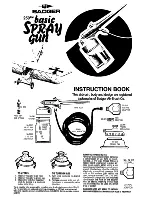
Before Starting
Care and Maintenance
Safety Precautions
• Flush tank, valve, and extension with clean water
regularly.
• Do not use ammonia-based cleaners, these
will damage the brass parts.
• Clean the filter at the hose/valve connec-
tion regularly.
• Do not use metal objects to clean the
orifices in the nozzle, this will disrupt
the liquid spray pattern.
• Use the B&G Cleaning Kit
(#22028000) for regular maintenance
and cleaning of the sprayer.
Note:
Residue from wettable powder
(WP), soluble powder (SP), and some
flowable (F) formulations can obstruct
the pump cylinder and valve of the
PestPro Sprayer. Regular flushing with
clean water is required to keep the
sprayer operating properly. Consider
weekly cleaning when the sprayer is
in daily use.
Trouble Shooting
PESTPRO 2000 BACKPACK SPRAYER
USER’S MANUAL
Problem:
Tank not holding pressure
Solution:
• Tighten tank cap
• Lubricate tank gasket when dry
Problem:
Holds pressure, but will not spray
Solution:
• Nozzle clogged, clean with a soft brush
• Clean strainer at the base of the valve, at the
hose / valve junction
Problem:
Valve body leaking
Solution:
• Replace O-ring at base of handle; replace
copper gasket at base of valve stem (in
GT-100 Repair Kit
Problem:
Tip Leaking
Solution:
Clean or replace check valve at end of valve
extension
Problem:
Handle locks up as if the tank is over-pressurized
Solution:
• Remove hose from bottom of tank (at the pump
unit) to release air pocket
The PestPro Backpack Sprayer is designed for a variety of
professional uses, such as outdoor perimeter spraying for
crawling insects and mosquitoes.
• Do not fill with a flammable, acid, or caustic liquids.
• Do not adjust the tip or change spray patterns while
depressing the valve trigger.
• Sprayer filled with liquid is heavy, use caution when bend-
ing, leaning, or walking; bend at the knees, not at the waist.
• Do not store or transport the unit while tank is pressurized.
• Inspect the hose, tank gasket, discharge valves, and nozzle
for signs of wear or damage. These parts must be in full
working condition to permit tank pressurization.
• Inspect the tank for unused pesticide; dispose of dilution
according to label directions; clean tank before adding new
insecticide.
Filling and Mixing
• Mix insecticides with the proper amount of water in a sepa-
rate container.
• Note gallon marks on the side of the tank and fill accord-
ingly.
• Add dilute insecticide to tank, then pump the sprayer handle
to prime the pump and fill the pressure cylinder. The liquid
in the tank will decrease as the cylinder is filled, add more
liquid to fill the tank.
• Mix all insecticides according to label directions.
Pressurizing the Tank
• Pumping the sprayer handle several times will pressurize
the tank.
• To relieve pressure open the cap.
Operation
95138231 Rev 6/10
50° coarse fan = 14.1 oz/min
80° fine fan = 6.4 oz/min
Pin stream = 8.9 oz/min (large)
4.5 oz/min (small)
Application Rates: 4 Way Tip
Operating Instructions




















